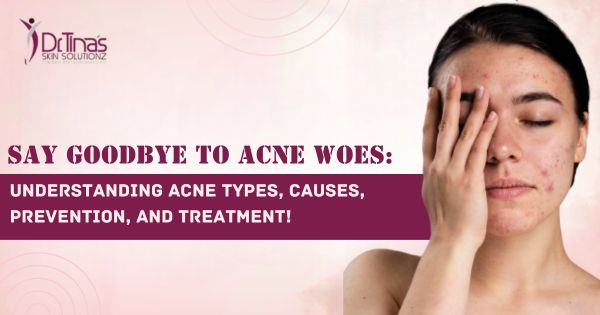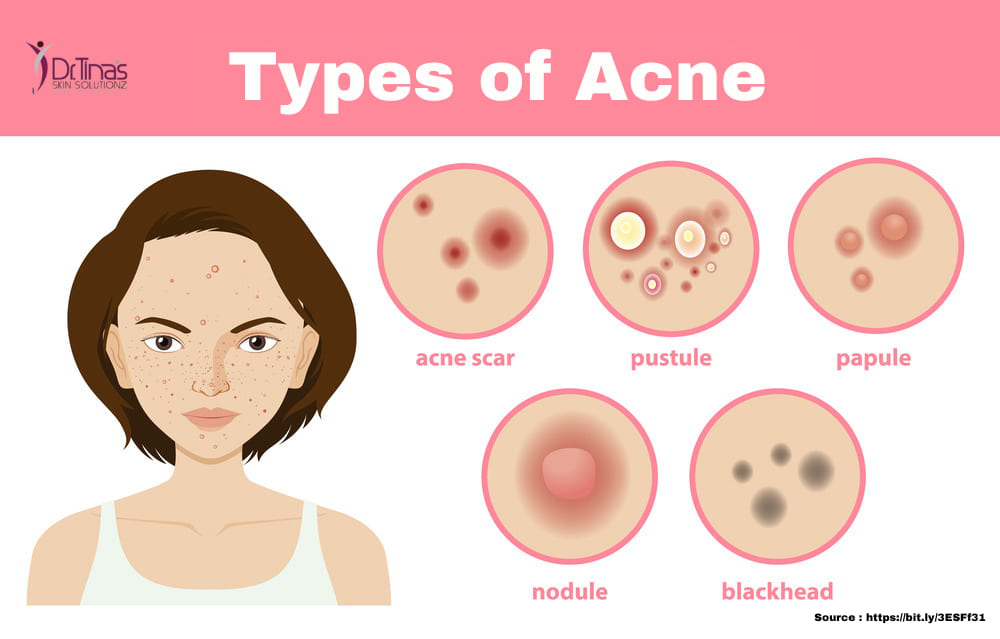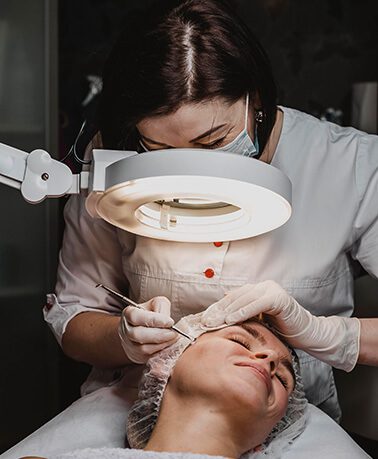Acne 101: A Comprehensive Guide to Understanding Acne Types, Causes, Prevention, and Treatment!

From the stubborn pimples that appear unannounced to the lingering scars that challenge our confidence, acne’s impact goes beyond skin deep. In this blog, we embark on a journey to understand the causes, types, and treatment procedures that empower us in the fight against acne.
What is acne?
In simpler terms, acne is a common skin condition that happens due to the hair follicles under the skin becoming clogged with excess oil, dead skin cells and bacteria. In a healthy skin, the oil(sebum) keeps the skin from drying. But for someone who has acne problem, the hair follicles, sebum and dead skin cells tend to stick together in the pores of the skin. The blockage that is created tends to lead to bacterial growth causing outbreaks of lesions, also known as pimples.
Common areas of acne breakouts
Acne breakouts are common in areas with higher concentration of oil glands. Here are some of the typical areas where acne tends to appear:
- Face: The forehead, nose, cheeks, and chin are typical facial acne problem regions. As it forms a “T” on the face, this acne is frequently called “T-zone” acne.
- Back (Bacne): Due to the presence of oil glands in these regions, acne can develop on the upper back, shoulders, and lower back also known as bacne.
- Chest: The region around the chest, especially the cleavage and upper chest, might also be prone to acne outbreaks.
- Neck: The neck is susceptible to acne, especially around the hairline and beneath the chin.
- Shoulders: The top portion of the shoulders, near the neck, is another area where acne is common.
Keep in mind that acne has the potential to appear anywhere in the body where oil glands and hair follicles are present, although these are the common areas where it frequently emerges.
Types of acne breakouts
Acne breakouts can manifest in various forms, each with distinct characteristics. Here are some common types of acne breakouts:
- Whiteheads (Closed Comedones): Little, flesh-colored or white lumps that form on the skin’s surface are known as whiteheads (closed comedones). They develop when a combination of oil, dead skin cells, and germs obstruct hair follicles, resulting in a closed pore.
- Blackheads (Open Comedones): Blackheads (Open Comedones) resemble whiteheads but are darker in color because the clogged material has been exposed to the air. The oxidation of the substance in the follicle, rather than dirt, is what gives the pigment its black color.
- Papules: Usually pink or crimson in appearance, papules are little, raised lumps. When touched, they may be sensitive and painful, indicating inflammation under the skin.
- Pustules: Unlike papules, pustules have a white or yellow core that is filled with fluid. These can be uncomfortable and are frequently referred to as “pimples.”
- Nodules: These are bigger, firm, and frequently uncomfortable lumps that develop beneath the skin’s surface. They are the result of severe inflammation and can be difficult to manage.
- Cystic Acne:The severe type of acne known as cystic acne is characterized by the appearance of nodules and big, inflammatory cysts. It may cause severe acne scars and be excruciatingly painful.
- Acne Rosacea: This long-term skin disorder typically affects the face and is characterized by redness, the presence of visible blood vessels, and occasionally lumps that resemble pimples. It differs from conventional acne and is frequently brought on by factors like heat, spice, and alcohol.
- Acne Mechanica: This kind of acne is brought on by friction, pressure, or heat on the skin, as a result of wearing restrictive clothing or creating skin-rubbing contact with sports equipment.
- Acne Fulminans: This exceedingly severe and uncommon form of acne can cause damaging lesions and ulcers. Frequent symptoms include joint discomfort and fever.
The specific type of acne and its severity can influence the recommended treatment approach. If you’re dealing with persistent or severe acne, it’s advisable to consult a dermatologist for proper diagnosis and personalized treatment options.

What causes acne to form?
Although the precise causes of acne are not entirely known, it is believed that a multitude of factors, including excessive sebum production, genetics, hormones, and certain medications, are to blame. Excessive stress, eating specific foods like dairy or sweets, and having an adverse reaction to particular skin care products are also thought to be acne triggers for some people.
Oftentimes, skin doctors and specialists are bombarded with questions about caffeine, dandruff, or hyaluronic acid being contributors to acne flare ups. Although acne is not directly caused by dandruff, some people may develop breakouts along their hairline, forehead, or other facial features where dandruff-affected skin flakes may come into contact.
A naturally occurring chemical, hyaluronic acid is present in the skin and other tissues. It is frequently used in skincare products to hydrate the skin and enhance its texture. Although hyaluronic acid itself is not known to cause acne, certain people may be sensitive to particular hyaluronic acid-containing product formulations, which might potentially cause skin irritation or breakouts in those particular cases. And caffeine too, is not a major contributor in the development of acne, excessive use of it has been shown to have negative effects on stress levels and sleep patterns.
It’s important to keep in mind that every individual has different skin, and what causes acne in one person may not in another. It’s a good idea to pay attention to how your skin responds when you use or consume certain substances like hyaluronic acid or caffeine if you feel that they may be causing your acne. If you’re worried about your acne, speaking with a dermatologist may help you pinpoint the precise causes and create a treatment plan that is suitable for your skin’s requirements.
Which treatment option is best for acne?
The most effective acne treatment will vary depending on the severity of the condition, the patient’s skin type, and how they respond to medications. Below is a common guideline for treating acne depending on its severity:
- For mild acne, initial treatment option includes use of OTC products containing chemicals like benzoyl peroxide or salicylic acid to help reduce inflammation and unclog the pores. It is also advised that people with mild acne should adopt a consistent skincare routine with a non-comedogenic cleanser and moisturize. Avoid exfoliating or scrubbing at all costs.
- OTC products might not always be effective for moderate acne, thus, using topical prescriptions like retinoids and antibiotics are recommended. And if these are not effective, then consulting a dermatologist is advised for more appropriate and custom acne treatment plan.
- For severe, chronic acne, skin specialists usually advise using oral drugs like isotretinoin (Accutane). With this drug, serious scarring can be avoided and oil production is considerably reduced.
- Cystic acne need medical attention. Dermatologists might inject intralesional corticosteroids into cysts to lessen swelling and speed up the healing process. A dermatologist should be consulted for a customized treatment strategy. They may evaluate the severity of your acne, provide suitable treatments, and modify the strategy based on how your skin reacts. Moreover, regular skincare, a healthy lifestyle, and appropriate skincare techniques can help with successful acne treatment and outbreak avoidance.
Essential Steps to take before acne treatment
A dermatologist should be consulted before beginning any acne treatment in order to correctly assess your skin problem and choose the best course of action for you based on your unique requirements and the severity of your acne. By using a mild skincare routine, avoiding abrasive scrubs, and picking at your skin, you may properly wash and prepare your skin. Tell your dermatologist about any allergies, illnesses, or prescription drugs you are currently using. Think about modifying your way of life as needed, such as eating nutritious food, staying hydrated, and reducing your stress. Knowing what to do and taking initiative can help you get the best, safest outcomes from your acne treatment.
When Should I See a Dermatologist For My Acne?
A dermatologist should be consulted for acne treatment if over-the-counter remedies are ineffective, the acne is severe or chronic, leaving scars or causing mental trauma, or if you’re unclear of the best course of action. A dermatologist can provide an accurate diagnosis, suggest tailored treatment option, and assist in avoiding potential consequences.
Continue Reading : 7 Signs for Teens to Go to Dermatologist for Acne
How do I prevent Acne Scarring?
Active acne treatment during active outbreaks is essential to reducing the development of acne scars. First, refrain from popping, squeezing, or picking pimples because doing so can aggravate the inflammation and raise the risk of scarring. Use mild skincare products that are non-comedogenic and cleanse your face twice daily to avoid congested pores. Frequent use of gentle chemical exfoliants can promote skin cell turnover and lessen the likelihood of scarring.
To protect healed skin and avoid hyperpigmentation, cover it with a broad-spectrum sunscreen before going outside. Skin health is also influenced by eating a balanced diet, drinking enough water, and managing stress. Early and persistent intervention can greatly minimize the appearance of acne scars and encourage smoother, more even-toned skin, especially when combined with attentive skincare routines.
To get proper guidance on treatment of active acne and lessen the likelihood of scarring, seek the advice of a dermatologist in severe instances and investigate treatments like retinoids, chemical peels, or laser therapy.
Must Read : Acne Scar Types and Their Safe Remedies
Acne Scar Treatment in Bangalore- Costs and More?
There are a number of acne scar treatment options available in Bangalore, each with its own benefits and drawbacks. The cost of acne scar treatment in Bangalore varies depending on the type of treatment, the severity of the scars, and the experience of the doctor.
Some of the most common, popular and sought after acne scar treatment options available in Bangalore include chemical peels for acne, microdermabrasion, laser therapies, radiofrequency micro-needling and fillers.
The best acne scar treatment for you will depend on the type and severity of your scars, your budget, and your individual preferences. It is important to consult with a qualified dermatologist to discuss your options and choose the best treatment for your needs.
Here are some of the factors that can affect the cost of acne scar treatment in Bangalore:
- The type of treatment: The cost of acne scar treatment will vary depending on the type of treatment that you choose. Some treatments, such as chemical peels and microdermabrasion, are relatively inexpensive, while others, such as laser therapy and radiofrequency micro-needling, can be more expensive.
- The severity of the scars: The cost of acne scar treatment will also vary depending on the severity of your scars. More severe scars will require more complex treatments, which will be more expensive.
- The experience of the doctor: The cost of acne scar treatment will also vary depending on the experience of the doctor who is performing the treatment. Doctors with more experience may charge more for their services.
It is important to get quotes from several different doctors before choosing an acne scar treatment in Bangalore. This will help you to ensure that you are getting the best possible price for the treatment that you need.
Top 10 Tips for Acne Care Treatment
Are you tired of dealing with pesky pimples and frustrating breakouts? Look no further! We’ve compiled the top 10 tips for acne care treatment to help you achieve clear, glowing skin.
- Wash your face twice a day with a gentle cleanser – This will help to remove dirt, oil, and bacteria from your skin, which can contribute to acne. Use a cleanser that is specifically designed for acne-prone skin.
- Use an oil-free moisturizer – This will help to keep your skin hydrated without clogging your pores. Look for a moisturizer that is labeled as “non-comedogenic,” which means it will not clog pores.
- Avoid touching your face throughout the day – When you touch your face, you can transfer dirt, oil, and bacteria from your hands to your skin. This can contribute to acne breakouts.
- Change your pillowcase every night– Oil and dirt from your face can transfer to your pillowcase overnight. This can contribute to acne breakouts.
- Don’t pick or squeeze your pimples – This can damage your skin and lead to scarring. If you have a pimple that is bothering you, see a dermatologist.
- Get regular exercise – Exercise can help to reduce stress, which can contribute to acne. Aim for at least 30 minutes of moderate-intensity exercise most days of the week.
- Eat a healthy diet – Eating a healthy diet can help to improve overall skin health. Make sure to include plenty of fruits, vegetables, and whole grains in your diet.
- Get enough sleep – When you don’t get enough sleep, your body produces more of the stress hormone cortisol. Cortisol can contribute to acne breakouts. Aim for 7-8 hours of sleep each night.
- Manage stress – Stress can contribute to acne breakouts. Find healthy ways to manage stress, such as exercise, yoga, or meditation.
- See a dermatologist if your acne is severe or persistent – If your acne is severe or persistent, see a dermatologist. They can recommend additional treatments to help clear up your acne.
Also Read : What are Some Do’s and Don’ts for Acne?
Acne is a common skin condition that can be frustrating and embarrassing. However, there is no need to suffer in silence. By understanding the different types of acne, their causes, and how to prevent and treat them, you can take control of your skin and achieve clear, healthy complexion.

Dr.Tina Ramachander is one of the best dermatologist in Bangalore and Medical Director at Dr.Tina’s Skin Solutionz, a skin care clinic in Bangalore. She completed her master’s in dermatology from the well acclaimed JJM Medical college in Karnataka and is now a practicising dermatosurgeon and Medical Cosmetologist in Bangalore.

